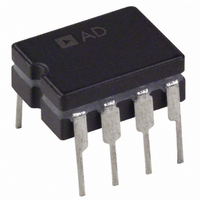OP27AZ Analog Devices Inc, OP27AZ Datasheet - Page 15

OP27AZ
Manufacturer Part Number
OP27AZ
Description
IC OPAMP GP 8MHZ LN PREC 8CDIP
Manufacturer
Analog Devices Inc
Datasheet
1.OP27GSZ.pdf
(20 pages)
Specifications of OP27AZ
Slew Rate
2.8 V/µs
Rohs Status
RoHS non-compliant
Amplifier Type
General Purpose
Number Of Circuits
1
Gain Bandwidth Product
8MHz
Current - Input Bias
10nA
Voltage - Input Offset
10µV
Voltage - Supply, Single/dual (±)
±4 V ~ 18 V
Operating Temperature
-55°C ~ 125°C
Mounting Type
Through Hole
Package / Case
8-CDIP (0.300", 7.62mm)
Op Amp Type
Precision
No. Of Amplifiers
1
Bandwidth
8MHz
Supply Voltage Range
± 4V To ± 18V
Amplifier Case Style
DIP
No. Of Pins
8
Operating Temperature Range
-55°C To +125°C
Current - Supply
-
Output Type
-
Current - Output / Channel
-
-3db Bandwidth
-
Lead Free Status / RoHS Status
Contains lead / RoHS non-compliant
Available stocks
Company
Part Number
Manufacturer
Quantity
Price
Part Number:
OP27AZ/883
Manufacturer:
ADI/亚德诺
Quantity:
20 000
Part Number:
OP27AZ/883C
Manufacturer:
ADI/亚德诺
Quantity:
20 000
Company:
Part Number:
OP27AZ/883C/Q
Manufacturer:
a
Quantity:
19
Part Number:
OP27AZ/883Q
Manufacturer:
ADI/亚德诺
Quantity:
20 000
Part Number:
OP27AZ7
Manufacturer:
ADI/亚德诺
Quantity:
20 000
COMMENTS ON NOISE
The OP27 is a very low noise, monolithic op amp. The out-
standing input voltage noise characteristics of the OP27
are achieved mainly by operating the input stage at a high
quiescent current. The input bias and offset currents, which
would normally increase, are held to reasonable values by the
input bias current cancellation circuit. The OP27A/E has I
and I
is particularly important when the input has a high source
resistance. In addition, many audio amplifier designers prefer
to use direct coupling. The high I
designs have made direct coupling difficult, if not impossible,
to use.
Voltage noise is inversely proportional to the square root of bias
current, but current noise is proportional to the square root of
bias current. The noise advantage of the OP27 disappears when
high source resistors are used. Figure 38, Figure 39, Figure 40
compare the observed total noise of the OP27 with the noise
performance of other devices in different circuit applications.
Figure 38 shows noise vs. source resistance at 1000 Hz. The
same plot applies to wideband noise. To use this plot, multiply
the vertical scale by the square root of the bandwidth.
At R
With R
resistor noise rather than current or voltage noise. lt is only
beyond R
argument can be made that current noise is not important for
applications with low-to-moderate source resistances. The
crossover between the OP27 and OP07 noise occurs in the 15 kΩ
to 40 kΩ region.
Figure 38. Noise vs. Source Resistance (Including Resistor Noise) at 1000 Hz
S
Total
OS
100
< 1 kΩ, the low voltage noise of the OP27 is maintained.
50
10
S
5
1
of only ±40 nA and 35 nA at 25°C respectively. This
50
< 1 kΩ, total noise increases but is dominated by the
S
Noise
of 20 kΩ that current noise starts to dominate. The
OP27/37
OP08/108
100
5534
OP07
=
REGISTER
NOISE ONLY
⎡
⎢
⎢
⎢
⎢
⎣
(
(
(
Voltage
Current
Resistor
R
S
—SOURCE RESISTANCE ( Ω )
500
Noise
Noise
Noise
1k
B
, V
)
)
2
×
2
+
e.g. R
e.g. R
R
OS
1 R
2 R
S
, and TCV
)
S
S
S
S
2
5k
UNMATCHED
= R
MATCHED
= 10k Ω , R
+
R
R
⎤
⎥
⎥
⎥
⎥
⎦
S1
S1
S2
1
10k
= 10k Ω , R
2 /
S1
= R
OS
S2
S2
of previous
= 0
= 5k Ω
1
2
50k
B
Rev. F | Page 15 of 20
Figure 39 shows the 0.1 Hz to 10 Hz p-p noise. Here the picture
is less favorable; resistor noise is negligible and current noise
becomes important because it is inversely proportional to the
square root of frequency. The crossover with the
in the 3 kΩ to 5 kΩ range depending on whether balanced or
unbalanced source resistors are used (at 3 kΩ the I
error also can be 3× the V
For low frequency applications, the
OP27/OP37
error is important.
Figure 40 illustrates the 10 Hz noise. As expected, the results are
between the previous two figures.
Figure 40. 10 Hz Noise vs. Source Resistance (Includes Resistor Noise)
Figure 39. Peak-to-Peak Noise (0.1 Hz to 10 Hz) as Source Resistance
100
500
100
50
10
1k
50
10
5
1
50
50
OP07
OP27/37
OP08/108
5534
OP27/37
OP08/108
when RS > 3 kΩ. The only exception is when gain
100
100
OP07
5534
REGISTER
NOISE ONLY
REGISTER
NOISE ONLY
R
R
(Includes Resistor Noise)
S
S
—SOURCE RESISTANCE ( Ω )
—SOURCE RESISTANCE ( Ω )
500
500
Audio Applications
OS
spec).
1k
1k
1
2
OP07
e.g. R
e.g. R
e.g. R
e.g. R
1 R
2 R
1 R
2 R
S
S
S
S
S
S
S
S
UNMATCHED
= R
MATCHED
= 10k Ω , R
5k
5k
UNMATCHED
= R
MATCHED
= 10k Ω , R
R
R
is better than the
R
R
S1
S1
S1
S2
S1
S2
= 10k Ω , R
= 10k Ω , R
10k
10k
S1
S1
= R
= R
OP07
1
B
S2
S2
S2
S2
2
and I
= 0
= 5k Ω
= 0
= 5k Ω
occurs
50k
50k
OP27
OS





















